| |
|
Rama Prasad Goenka
Ghanshyam Das Birla
Mr. Bhupendra Singh
Dayanidhi Maran is the Union minister for Textiles
Mr. Sudripta Roy
Late Mr.Arun Bajoria
Rama Prasad Goenka
Industrialist Rama Prasad Goenka, better known as R P Goenka, died early
morning on April 14, 2013 at his residence in Kolkata after a brief illness.
Known as the country's 'takeover specialist', the 83-year-old industrialist was suffering from old-age related illnesses and breathed
his last at 6am, family sources said. Eldest son of Keshav Prasad Goenka, he belonged to one of the oldest
business families of the city. RP Goenka is survived by his wife Sushila and sons Harsh Vardhan and Sanjiv.
Goenka studied History from the prestigious Presidency College here and
later attended an advanced management programme at the Harvard University
in USA. Described as "one of Bengal's true champions of industry" by chief
minister Mamata Banerjee, RP Goenka established RPG Enterprises in 1979
which included Phillips Carbon Black , Asian Cables, Agarpara Jute Mill and Murphy India with a turnover of
about Rs 100 crore.
Goenka was one of the few industrialists who did not move out of West
Bengal despite decline in the industrial atmosphere in the turbulent 1970's and 1980's and instead took over several industries
owned by expats, who sold off their interests and left for their native
places during this period. The takeover baron acquired one giant company after another during the 80s, expanding the group's
footprint across several businesses, including tyre, carbon black, transmission, pharmaceuticals, IT, power generation and music.
In 1990, his sons Harsh Vardhan and Sanjiv took over as chairman and
deputy chairman respectively of RPG Enterprises. In 2011, Sanjiv Goenka set up the RP-Sanjiv Goenka Group for his own
brand identity. Harsh Goenka continued as chairman of RPG Enterprises.
RP Goenka remained chairman emeritus of both the groups with a combined turnover of around Rs 30,000 crore.
He had served as president of the Federation of Indian Chambers of
Commerce and Industry ( FICCI and Confederation of Asia-Pacific Chambers of Commerce and Industry.
For several years he was chairman, board of governors, IIT-Kharagpur, which later conferred on him an honorary Doctor of Science degree.
He also took interest in politics and was a member of Rajya Sabha from
2000 to 2006. Goenka was known to be an excellent crisis manager and was close to Jyoti Basu.
Following his demise, several industrialists, ministers and leaders
visited the Goenka residence in south Kolkata to pay their last respects."I express my heartfelt condolence for the sad demise of Shri RP
Goenka. Today we have lost one of Bengal's true champions of industry," chief
minister Mamata Banerjee said in a message. Banerjee, who herself was ill and was released from hospital yesterday,
was represented by minister Firhad Hakim who paid floral tributes to the
departed industrialist at the Goenka residence. |
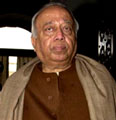
Rama Prasad Goenka |
|
|
Ghanshyam Das Birla
Ghanshyam Das Birla, a doyen of Indian industry was
the man who laid the foundations of the Birla Empire and the Federation
of Indian Chambers of Commerce and Industry (FICCI). He was the
founder of Keshoram Cotton Mills and Birla Jute Mills in Bengal.
Ghanshyam Das Birla was born on 10th April 1894 in Pilani,
Rajasthan. His grandfather Shiv Narayana Birla from the traditional marwari business of lending
money against pawned item diversified his business. To establish business in cotton dealership he moved to
Mumbai with a modest capital and left the hometown Pilani in Rajasthan.
After a successful venture he build a huge mansion by the name `Birla
Haveli in Pilani.
Ghanshyam Das Birla died in 1983 at the age of 90. There is a memorial to Ghanshyam Birla in
Golders Green Crematorium, Hoop Lane, London. It comprises a large statue overlooking the gardens with an inscription.
Ghanshyam Das Birla entered the business arena during the time of First
World War and moved further to diversify them into other areas. He established a cotton mill in Sabzi Mandi, and later established Keshoram
Cotton Mills. He wanted to turn the pawned items business into manufacturing business. Along with cotton mills he diversified to jute
business and shifted his base to Calcutta (Kolkata) city in West Bengal, which was the
world`s largest jute producing region. He established Birla Jute Mills
in Bengal, much to the consternation of established European merchants.
Ghanshyam Das Birla had to cover a number of obstacles as the British
and Scottish merchants with unethical and monopolistic methods tried to
close his business. Birla`s business reached its pick when supply problem arises throughout the British Empire due to World War I.
With an investment of Rs.50 lakhs in 1919, the Birla Brothers Limited was formed. A mill was set up in Gwalior in the same year. In 1930s,
G.D. Birla set up Sugar and Paper mills. In 1940s, he ventured into the
territory of cars and established Hindustan Motors. After independence,
Ghanshyam Das Birla invested in tea and textiles through a series of acquisitions of erstwhile European companies. He also expanded and
diversified into cement, chemicals, rayon and steel tubes.
A close associate of Mahatma Gandhi, G.D Birla was the most important
pre- Independence contributor to the Indian National Congress. He also
advised Gandhiji on economic policies. After independence, the Birlas expanded their business and started production in many fields. Near
Mirzapur, he, in collaboration with Caesar, an American friend, set up
an Aluminum Plant `Hindalco`.
Ghanshyam Das Birla also founded several educational institutions. Birla Institute of Technology and Sciences
(BITS) Pilani has today evolved into one of India`s best engineering schools. He also established many temples, planetariums, and hospitals.
In 1957, he was awarded India`s second highest civilian honour, the
"Padma Vibhushan" by the Government of India. G.D. Birla award for
scientific Research has been established to encourage scientists for their contribution in the various fields of scientific Research in his
honor. The Birla family is one of the foremost business houses in India.
During the decades of 70`s and 80`s, Birla brothers were among the topmost Industrial Houses of India. Their businesses vary from
petrochemicals and textiles, jute to automobiles and Infocomm.
|
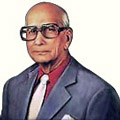
April
10, 1894 - 1983
|
|
|
BHUPENDRA SINGH - NEW SECRETARY GENERAL OF IJSG
Mr. Bhupendra Singh has joined as the new Secretary General of the
International Jute Study Group (IJSG) at its headquarters in Dhaka on October 01, 2010 as the successor of Mr. Sudripta Roy (India). Mr.Singh, a national of India, is a member of the Indian Administrative
Service (IAS) and has put in 23 years in the civil service of the Government of India holding a number of important positions.
Prior to joining the IJSG, he was working as the Secretary, Ministry of
Social Welfare, Uttar Pradesh, Government of India. Earlier, he was the
Joint Secretary to the Government of India in the Ministry of Textiles
and looking after various natural as well as manmade fibres including jute, silk, and wool. He was also in charge of promoting technical
textiles in the country. He took several initiatives in making the jute
industry modern and vibrant through modernization and diversification of
jute products. Mr. Singh was the Project Director of Jute Technology Mission of Government of India. He was also a Director of the Boards of
the Jute Corporation of India (JCI), the Jute Manufactures Development
Council (JMDC) and the then National Council for Jute Diversification (NCJD).
Besides, he worked in the Ministries of Home Affairs, Sports & Youth
Affairs, Industrial Development, Revenue, Tourism, Rural Development and
General Administration both in the Government of India and in the Government of Uttar
Pradesh. The most important task before him as the fourth Secretary General of the IJSG will be:
(a) to revive and revitalize the jute fibre as a natural fibre which would provide livelihood opportunities to millions of farmers and
breathe new life in a decadent industry;
(b) to provide proper focus to allied natural fibres like kenaf, sisal, coir and hemp;
(c) to promote diversification of these natural fibres mainly in the areas of technical textiles like geotextiles and agro textiles;
(d) to ensure application and commercialisation of previous studies
and R&D findings in studies sponsored by IJSG; and
(e) to ensure continuation of IJSG as the duly international organisation dealing with jute.
The immediate priorities for him would be to embark upon the extension
of the organisation and also a fruitful renegotiation of the agreement
establishing the IJSG which will lead to a massive membership drive to
bring into the fold all stakeholders of natural fibres which would include not only allied fibres using nation states but also a large
world wide private sector.
It may be mentioned that Mr. Bhupendra Singh was appointed as the
Secretary General of the IJSG at its Eleventh Session of the Council held during 02-03 May 2010.
Source: International Jute Study Group (IJSG) |
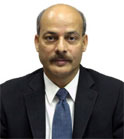
Mr.Bhupendra Singh has joined as the new Secretary General of the
International Jute Study Group (IJSG) at its headquarters in Dhaka on October 01, 2010
|
|
|
Dayanidhi Maran
Dayanidhi Maran is the Union minister for Textiles, a member of parliament in India’s 15th Lok Sabha from Chennai Central
constituency. He was also a member of Parliament in 15th Lok sabha holding Minister of textile in the Union Cabinet .
He was born in December 5, 1966 in Kumbakonam , Thanjavur , Tamil Nadu.
He is the son of Late Mr.Murasoli Maran and the grandnephew of Dravida Munnetra Kazhagam
(DMK) president M Karunanidhi. He is the younger brother of Kalanidhi Maran
, the founder and managing director of Sun Network , the group that owns and operates the
largest number of satellite television channels in southern India in four languages. He is a graduate in economics.
He contested as a DMK party candidate to the 14th Lok Sabha from Central
Chennai Constituency in Chennai in the State of Tamil Nadu in Parliamentary Elections held in April – May 2004 and elected as a Member
of Parliament. He was appointed as Union Minister for Communications and Information Technology on 26.05.2004.
As of 2004 , he was an Indian millionaire having declared assets of 16 million Indian rupees (approx. 360,000 US dollars .Maran reduced the mobile and landline call rates drastically during his
tenure as Union IT and Communications minister. He brought in investments well in excess of $30b for the IT sector alone and set the
ball rolling for making India a chip manufacturing hub. During his
period the growth of Internet Subscribers including Broadband is higher. |
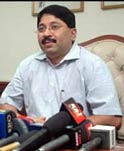
Dayanidhi Maran is the Union
minister for Textiles
Dayanidhi Maran Textiles Ministe |
|
SUDRIPTA ROY - SECRETARY GENERAL OF IJSG
Mr. Sudripta Roy joined as the new Secretary General of the International Jute Study Group
(IJSG) at its headquarters in Dhaka on September 06, 2007 replacing Mr. A.F.M. Sarwar Kamal
(Bangladesh). Mr. Roy, a national of India, is a member of the Indian Administrative Service
(IAS) and has put in 29 years in the civil service of the Government of India and holding a number of important positions.
Prior to Joining the IJSG, he was working as the Joint Secretary to the Government of India in the Ministry of Textiles and looking after the two divisions of natural fibres i.e. Cotton and Jute along with the industry sector. He was also holding the
additional charge of Jute Commissioner of India. He took several initiatives in making
the jute industry modern and vibrant through modernization and diversification of jute products. He was involved in preparing a bill for the creation of “The Jute Board” which has been
introduced in the Parliament of India. This bill provides for bringing numerous agencies dealing with the production, marketing and manufacturing of jute under one roof to create necessary synergy. Mr. Roy was Director in Boards of
National Jute Manufacturers Corporation Limited (NJMC), the Jute Corporation of India (JCI), the Jute Manufacturers Development Council (JMDC) and National Council for Jute Development (NCJD). He was also a member of Governing Council of Indian
Jute Industries Research Association (IJIRA), a Research and Development
Organisation. Besides textiles, he worked in the Ministries of Urban Development, Commerce and Supply, Environment, Revenue, Rural Development, Health, General Administration and Education both in the Government of India and in Government of Himachal
Pradesh.
Mr. Sudripta Roy was appointed as the Secretary General of the IJSG for a period of three years at its eighth Session of the Council held during 3 May
2007.
Source: International Jute Study Group (IJSG) |
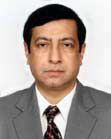
Mr. Sudripta Roy joined as the new Secretary General of the International Jute Study Group
(IJSG) at its headquarters in Dhaka on September 06, 2007
|
|
Arun Bajoria passes away
Kolkata, March 28: Leading jute industrialist Arun Bajoria is no more.
Bajoria, who shot to fame by raiding companies such as Bombay Dyeing and Ballarpur Industries, breathed his last this morning at a Mumbai hospital after a brief illness.
Bajoria, 62, is survived by four daughters, his wife and mother. His body was flown to Calcutta in the evening for the last rites. Bajoria owned about a dozen jute mills in Bengal and Andhra
Pradesh. With a daily production of 600 tonnes, he controlled nearly 25 per cent of the country’s jute goods production.
The reclusive man shot to fame in 2000 when he cornered a 14 per cent stake in Bombay Dyeing and threatened to take over the Wadia company. The Wadias had to take Ratan Tata and
Keshub Mahindra’s help to fend off Bajoria’s challenge. However, Bajoria later sold off his shares in Bombay Dyeing . The jute industrialist also bought large chunks of shares in Tata Steel, which he later sold off.
Bajoria, who was president of the Indian Jute Mills Association for three years from 2004 to 2007, is said to be one of the most cash-rich industrialists in
Kolkata. His business interests also included real estate. He owned a number of prime properties in the city.
IJMA president Sanjay Kajaria, said, “An era has ended with the passing away of Bajoria. He was the undisputed leader of the jute industry.’’
A science graduate from St. Xavier’s College, he started looking after father Radhey Shyam Bajoria’s Hooghly Jute Mills
when he was still studying. Bajoria acquired Hukumchand jute mill from the K.K. Birla group in the mid-eighties and owned a number of other mills such as Waverly, Bauria, Fort William and India Jute.
Source: The Telegraph |

Leading jute industrialist Arun Bajoria is no more.
IJMA president Sanjay Kajaria, said, “An era has ended with the passing away of
Bajoria. He was the undisputed leader of the jute industry.’’ |
|

